- Home
- Jeff Mariotte
The Burning Season Page 15
The Burning Season Read online
Page 15
“That’d be good. If not, you got handcuffs, right?”
Vartann shot her a knowing grin. Cops and nurses tended to get along, because both professions dealt with people at their worst. People in those jobs had to develop thick skins, good senses of humor, or both, just to get by. “I got ’em.”
She directed him to Daniels’s open door. Vartann greeted the uniformed officer sitting beside it, tapped twice and walked in. Daniels was sitting up in bed, cross-legged, with papers scattered around him. Vartann recognized him from all the media coverage. He also recognized Joanna Daniels, a pretty blonde whose picture was in the paper almost as often as her husband’s. She was involved in a number of charities around town, and seemed to be a social butterfly. A woman clad in a hospital gown sat in a wheelchair beside the bed with a stack of files on her lap, and another man slumped in a visitor’s chair in a corner, holding a paperback book.
They were all looking his way. “Mr. Daniels, I’m Lou Vartann. LVPD.”
“It’s always a pleasure to meet a dedicated law officer,” Daniels said. He was as slick as a politician, tossing off a slick smile even though his face looked like he had been using it to hammer nails. “Something I can do for you?”
Vartann glanced at the other people in the room. Daniels got the hint. “Sorry, where are my manners? This is my wife, Joanna, Maureen Cunningham, my administrative assistant—really, my professional lifeline, and Maureen’s husband, Brett.”
That explained why the other man wasn’t injured or part of the work party. “Pleased to meet you,” Louis said, shaking their hands. “I’m sorry about your injuries. Believe me, we’ll find the perpetrator.”
“Thank you,” Maureen said. Vartann took a closer look at her. She had been banged up in the accident; a bandage clung at a diagonal over her left eyebrow, and that side of her face was discolored, bruising turning it shades of black and purple. But beneath the bruising and swelling, and despite blond hair cut in a conservative style, between chin and shoulder-length and seemingly designed not to call attention to her, she was, Vartann suspected, an attractive woman, with even features and clear, brown eyes. Her husband looked like he might have been a college athlete, broad-shouldered, narrow at the hips and waist. He had sandy blond hair, small eyes, and a neat brush of a mustache.
“Thanks,” Brett Cunningham said. “You can’t imagine how terrifying this all is.”
“We’ll be on it night and day,” Vartann assured him. “We’ve got an amazing criminal investigation team, and honestly, what usually undoes people who do things like this is that they can’t keep their mouths shut about it. The whole point is that they’re after attention for some cause or other. Once they start bragging or making demands, it’s only a matter of time.”
“I hope you’re right,” Daniels said. “What brings you here?”
“Just checking in, really,” Vartann said. “I see there’s an officer outside.”
“That’s right. There’s been someone there nonstop.”
Vartann scanned the floor. There were bits of white gauze strewn here and there, like the remnants of a gentle snowfall. “And you’ve been up and around quite a bit, I’ve heard.”
“Sitting still is hard for me,” Daniels admitted. “Always has been. I think most business executives suffer from ADD, if you want to know the truth. In the media game if you can’t multitask, jump from one thing to another with no downtime in between, you simply aren’t doing your job.”
“Must be hard for your employees to keep up with you.”
“We don’t even try,” Maureen Cunningham said. “We all become specialists in one area, or a few of them, so we can offer advice where we’re strongest and then back away.”
“But isn’t an administrative assistant a generalist almost by definition?” Vartann asked.
“I suppose so,” Maureen said. “I don’t get too deep into the weeds, though. I couldn’t run a camera or an editing board if my life depended on it. But I can make hotel reservations like nobody’s business.”
“Travels too much, that’s for sure,” Brett said. “She’s never at home.”
Maureen chuckled. “He’s right, I’m sorry to say. Most of my time is spent here, but there are always regulatory issues in DC or industry conferences in New York or somewhere else. Anyplace Dennis goes, either I have to go, or Bryan does. Sometimes both of us.”
“We all do at least two jobs,” Daniels explained. “We have to keep the programming on the air, which means gathering news and sometimes massaging the egos of our on-air talent. And we have to do the other things, the behind-the-scenes business that keeps the cameras rolling. The routine business elements, the advertising sales, and so on.”
“This week, you’re getting the kind of publicity money can’t buy,” Vartann pointed out. “Maybe it’ll boost your ratings, make those ad sales a little easier.”
“We all like ratings,” Daniels said. “But I’d rather it was for what we do, not for having a car fall on top of me.”
“Understandable,” Vartann said. “While you’ve been not sitting still, you haven’t left the hospital, have you?”
“I’m headstrong, not stupid,” Daniels said. “One of those nurses would tackle me if I headed for the door. The instant I’m cleared to leave, I will, but until then I follow doctor’s orders.”
“Sounds like a wise policy. Thanks for your time, Mr. Daniels. Mr. and Mrs. Cunningham.” Vartann offered a smile and left the room.
He stopped at the nurse’s station on his way out, to warn the nurse that Daniels would continue pushing his boundaries. As he was finishing up, the elevator opened and Garrett Kovash emerged.
Most cops recognized Kovash. He had been on the force for several years, a star of his Academy class, rising quickly to detective. But he had always been a little too ambitious for his own good, and that ambition had led to corner-cutting and allegations—never proven—of greater improprieties. Eventually he and the LVPD had decided that it was best to sever connections all the way around.
“Lou,” Kovash said. He wore a broad grin and stuck a hand out. “How’s it hangin’?”
That was a question to which there had never been any good answers, and Vartann didn’t try. “Garrett,” he said. Noncommittal and safe. “I thought you were on bodyguard duty.”
“My services extend to a wide range of activities,” Kovash said. Equally noncommittal, Vartann noted, if not more so. “Did I miss anything?”
“Your client’s driving the nurses crazy.”
“How do you think I feel? If I could keep him in a bunker, it’d be a hell of a lot easier to do my job.”
“It’ll just get worse if he runs for office, won’t it?”
“I’d love to talk him out of that. He’s stubborn enough to make mules look like pushovers.”
“How long were you gone just now?” Vartann asked.
“Why?”
“Just curious.”
Kovash shrugged. “Couple hours, I guess. You folks have a uni parked outside the door.”
“Right.” Vartann was intrigued by the timing of Kovash’s absence. “You mind showing me your shoes?”
“Always happy to do my part for law enforcement,” Kovash said. He held one of his leather shoes out for Vartann. It was black, buffed to a high gloss. “They’re Prada. Like ’em? I can get you a sweet price.”
“I meant the soles,” Vartann said. “But thanks anyway.”
“Your loss.” Kovash turned and showed Vartann the sole of his right shoe, then shifted and raised his left.
There was a tiny shred of white cotton stuck to that shoe. “Hold that pose a second,” Vartann said. He addressed the nurse at the counter. “Do you have a clean envelope?”
“Sure,” the nurse said. She rummaged around, came up with a business-sized paper envelope, and handed it to Vartann.
“Just another second,” Vartann said.
“Good. I feel like I’m frozen in a game of hopscotch. Or what’s that one wher
e you have to stop when the kid in front turns around? Simple Simon.”
Vartann plucked the cotton from Kovash’s shoe and dropped it into the envelope. “You’re good,” he said. “Simple Simon says thanks.”
Kovash put his foot down. “What was all that about?”
“Let’s just say I’m a Prada fan,” Vartann said. He tucked the envelope into the inside pocket of his jacket. He was no CSI, but he knew the lab could compare the sample to the one found at Alec Watson’s office. If they were a match, that would suggest taking a considerably closer look at Kovash’s recent whereabouts.
Joanna Daniels emerged from her husband’s room with a smile on her face. She looked tired, but otherwise resembled the photos Vartann had seen on the society page. “I thought I heard you,” she said.
“I was on my way in,” Kovash said. “But Lou waylaid me.”
She reached Kovash and put a hand on his arm. “I worry when you’re not around, Garrett,” she said.
Kovash nodded toward Vartann. “The PD has a handle on things. Nobody’s touching Dennis while they have someone outside his door.”
“It’s not the same. Besides, what if the officer has to go to the bathroom or something?”
“I’m here now,” Kovash said.
Vartann broke in. “Well, you will be in a minute.” He turned back to the nurse. “Is there a private place where we could talk briefly?”
The nurse contemplated for just a moment. “There’s a private room down the hall. Four-seventeen. It was vacated this morning and there’s no one in it yet.”
“That’ll work.”
Kovash was staring at Vartann with concern. “What’s this about?”
Vartann hadn’t planned to say anything to Kovash. Not yet. But when he saw the way Daniels’s wife reacted to Kovash’s arrival, he decided to change his play. A friendly greeting didn’t necessarily add up to an affair—but if the two of them were involved, that could amount to a motive. The mogul’s wife and his bodyguard would have plenty of opportunity to take him out. And it had already been established that Kovash determined the route Daniels and his people would take back to the office after the fundraiser. “He’ll be there in a couple of minutes, Mrs. Daniels,” he said. “Come on, Garrett.”
Joanna Daniels sighed but returned to her husband’s room. Kovash followed Vartann to room 417. When they were inside, Vartann closed the door. Kovash’s expression had changed from one of acceptance to an angry scowl. “What the hell is this, Lou?”
“I took a bit of gauze off your shoe.”
“Thanks, I guess. It’s all over the place around here.”
“It’s all over Daniels’s room, anyway.”
“That’s where I’ve been spending most of my time.”
“It’s the time away from there I want to talk about. Where were you, for, say, the last three hours or so?”
“I’ve been doing a little digging on my own, trying to identify and mitigate threats to my client.”
“Threats like Alec Watson?”
“I don’t know that Watson’s a threat, necessarily.”
“But you paid him a visit?”
“I did. He’s got a high profile and a large following. Of all the people who’ve been attacking Dennis—verbally, I mean—he’s the most visible. I wanted to see if he knew anything about the bombing. How did you know?”
“The gauze on your shoe. We found some in Watson’s office.”
“Why were you looking at Watson’s office?”
“I guess it hasn’t made the air yet. Watson’s dead, Garrett. Murdered.”
Kovash blanched. “What, today?”
“Couple hours ago. We’ve been keeping a lid on it, but it’ll be on the evening news, I’m sure.”
“How?”
“Automatic weapon. He was hit something like a dozen times.”
Kovash shook his head sadly. “He seemed like a pretty nice guy. I mean . . .”
“Right.”
“You do know automatic weapons aren’t my style, right?”
“I was hoping murder wasn’t your style.”
“I didn’t think I had to say that. You know my record.”
Vartann nodded. “I do. But you know I can’t let the past determine my actions now. There’s a first kill for every killer.”
“I’m no killer, Lou.”
“I believe you, Garrett. I just have to look at everything. Okay?”
“Sure, I understand.”
“So Watson was alive when you left him?”
“Alive and complaining. He thinks—thought—Dennis was pushing more of a far-left ideology. I tried to set him straight. I’m a Reagan man myself, a law and order conservative. If I thought Dennis was some kind of commie, I might have turned down the job.”
“Speaking of which, your job is to protect Daniels. Ours is to find the bomber. You do yours and we’ll do ours, okay?”
“I can’t promise I won’t look into it,” Kovash said. “That’s part of protecting him, as far as I’m concerned.”
“Well, keep it to a minimum, then. And stay out of our way.”
“I’ll make every effort,” Kovash said.
“You do that.”
Vartann offered his hand, and Kovash shook it. “I mean it, Garrett. You’re not a cop anymore. We’re on this, but if you run around leaving your footprints all over the investigation—almost literally, in this case—it could turn into a problem.”
“I didn’t kill Watson, Lou. You believe that, right?”
“I’m withholding judgment for now. I’ll keep you posted if that changes. In the meantime, stick close to your client so I know where to find you.” Vartann opened the door, walked out, and closed it behind him.
By the time he got on the elevator and the doors slid closed, Garrett Kovash had still not left room 417.
19
RAY HAD TURNED the trace he’d collected at Lucia’s house over to Hodges for analysis. The organic, potentially DNA-bearing evidence went to Carrie, the day shift DNA tech, along with a plea for immediate analysis. “As close to immediate as you can manage,” he’d added.
The tech was looking a little overwhelmed, and she nodded gratefully. “I’ll let you know the minute I’ve got something,” she promised.
“Thanks.” Ray left her to her work and went to find Detective Sam Vega, who had agreed to meet him at the lab. Vega was in the hallway, chatting with Mandy Webster. “Sam,” Ray said, “I appreciate you coming over.”
Vega made eye contact with Mandy and shrugged. “Duty calls.”
“It always does,” Mandy said. “Usually at inopportune moments.”
Vega chuckled, but joined step with Ray. “You healing okay?”
“I’m on my feet,” Ray said. “Now it only hurts when I laugh. Or breathe. Who needs two kidneys, anyway?”
Vega laughed. “What’d you want to see me about?”
“I was hoping to pick your brain a little—”
“Never something you want to say in the Crime Lab,” Vega interrupted. “Or around Doc Robbins.”
Ray let the jokes slide by. “I know you used to be with the gang unit, Sam. I wanted to see if you’d ever encountered a situation like one I’m facing.”
“What is it?”
“A Latino criminal enterprise, or mostly Latino, anyway. They were involved in human smuggling.”
“Bringing in undocumenteds?”
“Right.”
“You used the past tense.”
“Business has slowed there, so they’ve shifted their priorities. Now they’re going after former clients, ones who have become established enough here to have something to lose, and blackmailing or abducting them, threatening to turn them into ICE if they’re not paid off.”
“That’s downright sinister,” Vega said. “Clever, but cruel.”
“That’s not the worst of it. When their victims, or their families, aren’t immediately forthcoming, they have a nasty habit of severing hands. Apparently getting a lov
ed one’s hand in the mail can be quite the incentive.”
“I can imagine.” Vega’s forehead furrowed. “I don’t remember ever running into that sort of operation,” he said. “It’s been a while since I’ve been on the gangs detail, though. And this sounds more like an organized crime situation than a street gang.”
“I understand that. I just thought it was worth a shot.”
“Sure,” Vega said. “I’ll ask around. If I find out anything, I’ll let you know.”
“I appreciate it,” Ray said. “I’ve got a brand new hand, and I’d like to find its owner while there’s still something I can do for him.”
“You think this is related to those other hands that’ve turned up?”
“I think so, yes. They spread them around as sort of an early warning system. People in the victimized community know what it means, and it encourages them to keep quiet and pay up.”
“Nasty,” Vega said. “I’ll tap some of my CIs, and get back to you.”
“Thanks, Sam. Anything you can find out will be a big help.”
When Vega had left, Ray headed for the morgue. He hadn’t forgotten about the series of unclaimed hands that had been collected recently, but he hadn’t been focused on them, either. It was time to take another look.
“I need a hand, Albert,” he said when he arrived.
Dr. Robbins looked up from the corpse he was studying, raised his hands, and clapped them together three times. “Good enough?”
“I mean a specific hand. Or a set of them, really.”
“Which hands would those be, Ray?”
“Do you have many different sets? I’m looking for the ones that have come along lately without their arms attached. Or anything else.”
“Oh, those hands.” Robbins pointed a scalpel toward a bank of freezers. “They’re in cold storage.”
“Of course they are.” Ray used the morgue sink to scrub up, then donned a pair of poly gloves. “You mind if I take a look?”
“Be my guest,” Robbins said, bearing down on the corpse with the scalpel. “I’d give you a hand, but I’m up to my neck at the moment. Or this gentleman’s neck, at any rate.”

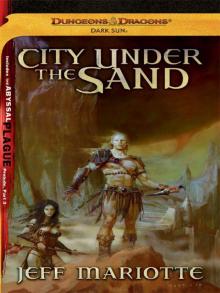 City Under the Sand
City Under the Sand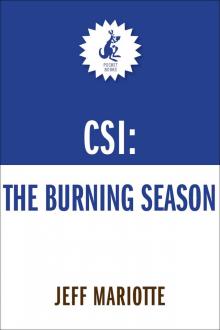 The Burning Season
The Burning Season Sanctuary
Sanctuary Winds of the Wild Sea
Winds of the Wild Sea Serpents in the Garden
Serpents in the Garden Close to the Ground
Close to the Ground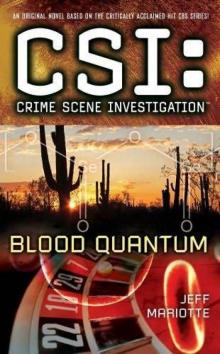 Blood Quantum
Blood Quantum Brass in Pocket
Brass in Pocket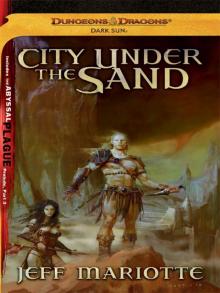 City Under the Sand: A Dark Sun Novel (Dungeons & Dragons: Dark Sun)
City Under the Sand: A Dark Sun Novel (Dungeons & Dragons: Dark Sun) Witch's Canyon
Witch's Canyon STAR TREK: The Lost Era - 2355-2357 - Deny Thy Father
STAR TREK: The Lost Era - 2355-2357 - Deny Thy Father Dawn of the Ice Bear
Dawn of the Ice Bear The Xander Years, Vol.2
The Xander Years, Vol.2 Ghost of the Wall
Ghost of the Wall 30 Days of Night: Light of Day
30 Days of Night: Light of Day Deny Thy Father
Deny Thy Father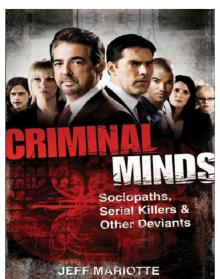 Criminal Minds
Criminal Minds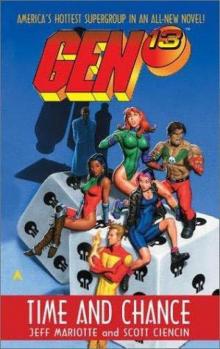 Time and Chance
Time and Chance The Folded World
The Folded World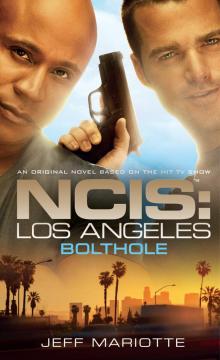 Bolthole
Bolthole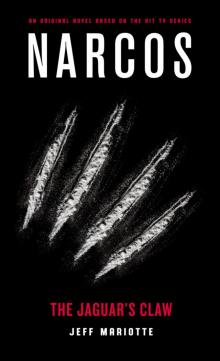 Narcos
Narcos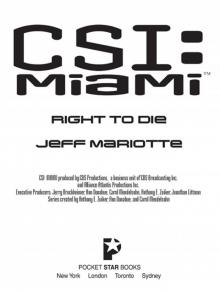 Right to Die
Right to Die